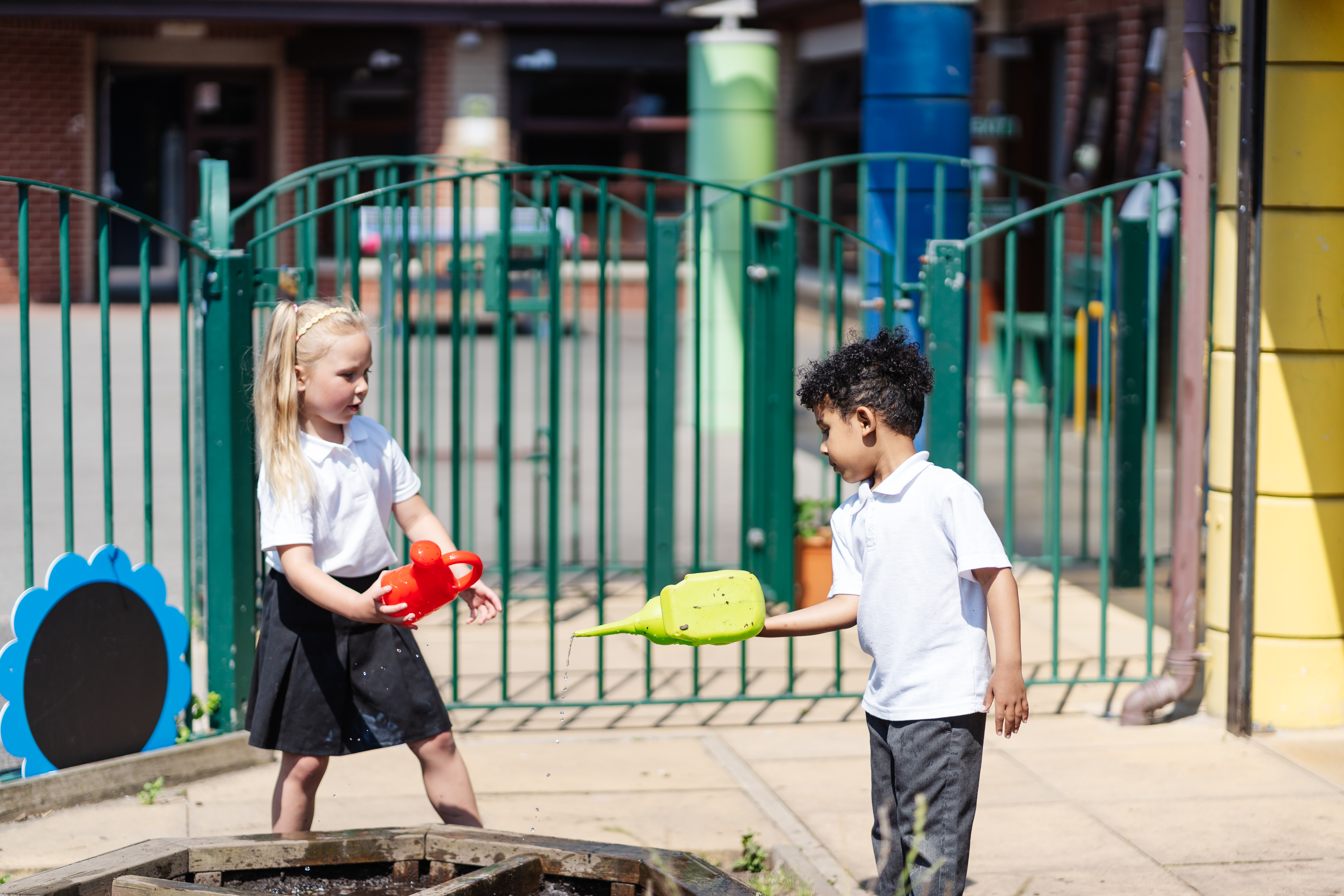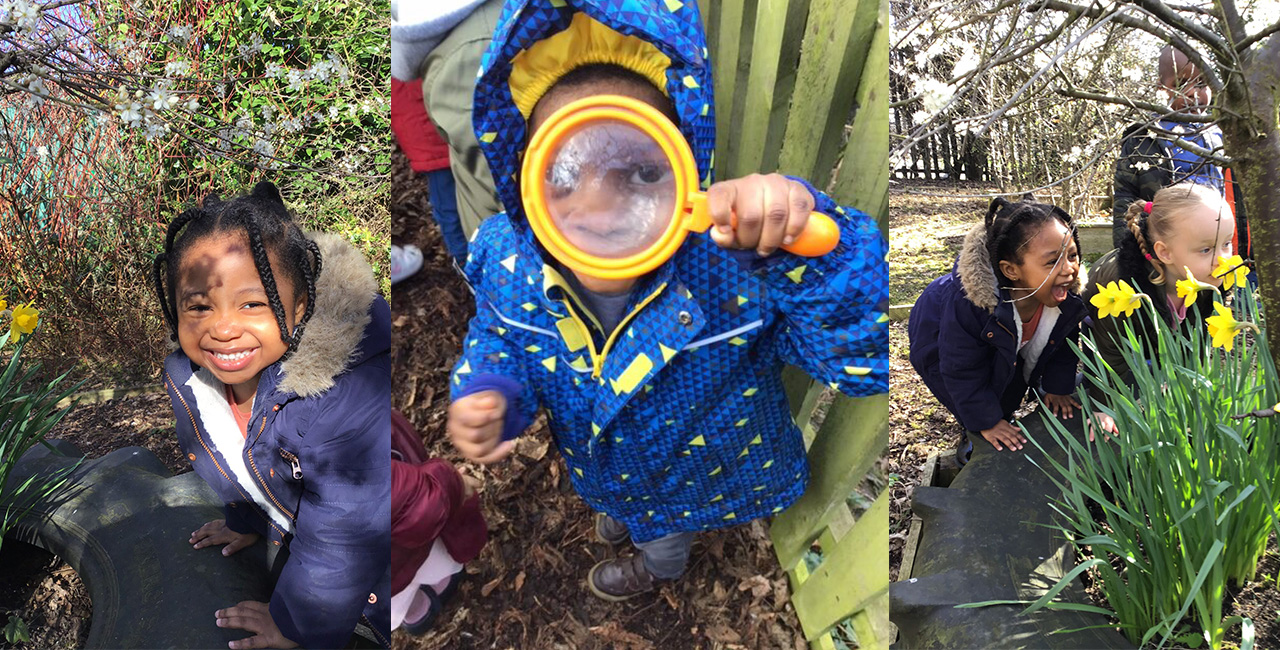Nursery
We have places available for your child to start Nursery in September, if they are 3 before the 31st August.
To apply call our main office

| We provide 15 hours per week of free nursery education: |
|
Monday, Tuesday 8:40am-3:25pm and Wednesday 8:40am-11:25am Wednesday 1:00pm-3:25pm, Thursday and Friday 8:40am-3:25pm |
You can apply anytime and if we have a space available your child can start the term (September, January, April) after their third birthday!
Our Provision
We provide challenging learning experiences, that help develop our children’s independence. Opportunities to practise skills through play are abundant.

Nursery: Autumn – Celebrations!
Literacy
We will be reading and joining in with stories including ‘The Gingerbread Man’ and ‘Dear Santa’.
We’ll be beginning to learn about the sounds (or phonemes) in words and also talking about words that rhyme.
Reception with be learning festive songs to create our own Nursery performance.
Maths
In Maths we’ll continue to practise our counting, helping the children to understand that the last number we say when counting tells us how many there are. We will be comparing groups of objects and talking about which group has more and which have fewer.
We will also be using real money in our role-play shop and using shapes to make our own pictures.
Outdoor Play
We love to play outdoors in Nursery!
Please make sure your child brings a waterproof coat each day. As it gets colder, each child should also bring a hat and gloves. Please make sure these are named so that we can get these back to you if they get lost.
Topic
Celebrations! – We will be finding out about how people celebrate Bonfire night, Diwali, Birthdays and Christmas. We will have our own Bonfire in Nursery!
The Gingerbread Man – We’ll be reading the traditional tale, ‘The Gingerbread Man’, and finding out how to make our own gingerbread people.
P.E (Sport)
P.E will be every Thursday. Please dress your child in a PE kit on this day.
We’ll be using the apparatus and movement play resources to help the children develop their balance, coordination and strength.
PSHE
We will be talking about our home lives, how we celebrate with our families and what we like to do when we’re not at Nursery. You can help your child by sharing picture of some of the things they do at home on Tapestry.
Starting Nursery? Road to Nursery
We've put together some information and listed key skills that will help your child make the best start they can in Nursery.
Click here to download a copy.
Eating
-
I can begin to use a knife and fork
-
I can eat my dinner with little support
-
I can begin to open fruit independently
Self-Care
-
I know when to wash my hands but may still need support to do so
-
I can ask for help to wipe my nose
-
I can have a drink without spilling
Getting undressed and dressed on my own
-
I can begin to put on my own shoes and socks
-
I can put my coat on
-
I can help with my clothing
Independence
-
I can separate from my mummy, daddy or my main carer
-
I am happy to tidy my belongings & look after my things
-
I am gaining confidence about starting school
Self-regulation
-
I can talk about my feelings using words like ‘happy’, ‘sad’, ‘angry’ or ‘worried’
-
I can follow rules and routines to help me organise myself
Routines
-
I have practised helping to put on my uniform
-
I have a good bedtime routine so I'm not feeling tired for school
-
I'm learning to eat at routine times through the day e.g. breakfast, dinner, tea
Toileting
-
I can go to the toilet on my own
-
I can ask for help to wipe myself if needed and flush the toilet
-
I can wash and dry my hands
Maths skills
-
I enjoy sorting and counting objects
-
I like joining in with number rhymes
-
I can recognise some shapes and colours
Interest in the world
-
I enjoy exploring the world around me
-
I am interested in exploring new activities or environments
-
I am starting to ask questions
Sharing and turn taking
-
I am beginning to share toys and take turns with a little support
-
I like starting to join in play with other children
-
I like talking to other children and making new friends with encouragement from an adult
Communication and Language
-
I can communicate using 4-5 words to make a short sentence e.g. ‘I want a drink’
-
I can learn new words quickly and start to use them when I communicate
Listening and Understanding
-
I can listen to others one to one or in small groups, when conversation interests me
-
I can follow a one-step instruction
-
I can concentrate on activities for longer e.g. when playing with a toy I like
Literacy
-
I like to look at picture books and listen to stories
-
I am starting to recognise print that is meaningful to me e.g. name label or number that represents age
-
I enjoy making marks in different media e.g. painting, drawing
Top Tips for Parents and Carers
-
Engage with the school’s transition process: Visit the school before your child starts. There will always be opportunities for parents and children to visit prior to their start date. Even though your child may not remember where everything is, at least the journey to school and teachers will be more familiar on their first day.
-
Be prepared: Be prepared the night before school; get uniform ready and help your child to pack their school bag as this will support their understanding of routines and the changes related to this.
-
Support independence: Support your child to get dressed independently. It may be quicker and easier for you to get your child dressed, but it really supports your children’s confidence and independence if they can manage this themselves. With access to the outdoors being part of your child’s learning in EYFS, they will be taking their coat on and off multiple times throughout the day!
-
Show interest and provide encouragement: Show a genuine interest in everything your child does, both in school and at home. Encourage them to talk to you about how they are feeling. Give them lots of praise, but there is no need to over praise - it is often better to show interest and encouragement. This will help them to feel confident and secure.
-
Have fun: Starting school is an anxious time for all children. Having fun and playing with your child helps to alleviate some of the anxiety, and play helps children to manage new situations and develop social skills.
-
Co-regulation and supporting emotions: Some children need support to manage their emotions. As a parent you can support this by tuning into your child’s emotions and helping them to manage their impulses, anger or distress. If young children don’t feel emotionally safe or are not helped to self-regulate they can struggle to learn.
-
Talk to the teacher: Make a point of talking to your child’s teacher if you are worried about anything at all. The more information the teacher has the better they can support your child to learn. It’s best to voice concerns early on even if you think that it’s just a small thing. Regularly attend parents’ evenings and school meetings - it shows your child and the school that you are interested in how everything is going.
Helpful Links for Parents
What to expect in the Early Years Foundation Stage
This guide is for parents/carers of children from birth to five years old. It will help you find out more about your child’s learning and development in the EYFS.
Starting school toolkit | PACEY
This toolkit is for parents, childcare professionals, and teachers to work together to help improve the transition process for children starting/returning to school.
BBC Tiny Happy People
Lots of great video clips of activities and information, filmed with families.
Family Hubs Network
Family Hubs ensure families with children aged 0-19 can access integrated early help to overcome difficulties and build stronger relationships.
Starting primary school: supporting your child - Health Under 5s
Preparing children to start primary school | Compass
Advice on preparing your child to transition from nursery to primary school, including what skills to aim for and top tips for getting there.
The Effects of Social Media on Parents and Parenting - Safes
This highlights some of the negative effects of overusing social media and the impact it can have on both parents and children.
NHS- Best Start in Life
Welcome to Better Health – Start for Life. The place for trusted NHS advice and guidance to help you have a healthy and happy baby during pregnancy, birth and parenthood.
